Wild Wild West Biographies
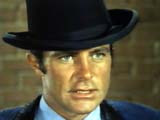
- Robert Conrad (James West)
- Ross Martin (Artemus Gordon)
- Michael Dunn (Dr. Miguelito Loveless)
- Other Villains
***** The following information can be read in a harder-to-use format on the www.turner.com website (if it's still there)
Robert Conrad
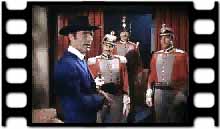 As the athletic, swashbuckling half of the West/Gordon team, Robert Conrad performed most of his own stunts for the series. Born Conrad Robert Falk in Chicago on March 1, 1935, he was a former boxer and nightclub singer before he embarked on an acting career. Prior to his work on The Wild Wild West, Conrad starred in the television series Hawaiian Eye and had bit parts in several films, including The Commies are Coming, the Commies Are Coming and Palm Springs Weekend. He had just completed a film called Young Dillinger when he began work as secret agent James T. West at the age of 29. Conrad had lived in Spain and been interested in Flamenco dance and bull fighting as a young man, a fitting background for his character.
As the athletic, swashbuckling half of the West/Gordon team, Robert Conrad performed most of his own stunts for the series. Born Conrad Robert Falk in Chicago on March 1, 1935, he was a former boxer and nightclub singer before he embarked on an acting career. Prior to his work on The Wild Wild West, Conrad starred in the television series Hawaiian Eye and had bit parts in several films, including The Commies are Coming, the Commies Are Coming and Palm Springs Weekend. He had just completed a film called Young Dillinger when he began work as secret agent James T. West at the age of 29. Conrad had lived in Spain and been interested in Flamenco dance and bull fighting as a young man, a fitting background for his character.
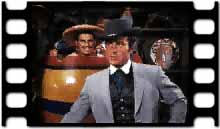 In the early '60s, he cut two records and did an American Bandstand appearance with friend Dick Clark. One of Conrad's recordings, "Mi Conformo," done for a Spanish language label, outsold the Beatles at that time in Latin America, he said in an interview. After The Wild Wild West was cancelled, Conrad went on to star in the series The D. A. and continued to work extensively in television, both in front of and behind the camera. He also directed a film called The Bandits. In the last few years, former agent West has appeared in several films, including the upcoming New Jersey Turnpike.
In the early '60s, he cut two records and did an American Bandstand appearance with friend Dick Clark. One of Conrad's recordings, "Mi Conformo," done for a Spanish language label, outsold the Beatles at that time in Latin America, he said in an interview. After The Wild Wild West was cancelled, Conrad went on to star in the series The D. A. and continued to work extensively in television, both in front of and behind the camera. He also directed a film called The Bandits. In the last few years, former agent West has appeared in several films, including the upcoming New Jersey Turnpike.
Ross Martin
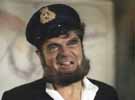
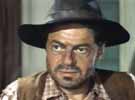 The first and only choice for the role of agent Artemus Gordon, master of disguise, Ross Martin was born Martin Rosenblatt in Grodek, Poland, on March 22, 1920. Still an infant when his parents immigrated to America, Martin grew up in New York City and spoke Yiddish, Polish and Russian before even learning English. He later added French, Spanish and Italian to his amazing repertoire. Though he received honors with his degrees in psychometrics and law, Martin pursued an acting career along with his studies, starting as a standup comic and performing on radio and early television.
The first and only choice for the role of agent Artemus Gordon, master of disguise, Ross Martin was born Martin Rosenblatt in Grodek, Poland, on March 22, 1920. Still an infant when his parents immigrated to America, Martin grew up in New York City and spoke Yiddish, Polish and Russian before even learning English. He later added French, Spanish and Italian to his amazing repertoire. Though he received honors with his degrees in psychometrics and law, Martin pursued an acting career along with his studies, starting as a standup comic and performing on radio and early television.
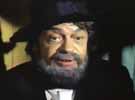
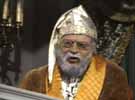 His first film was the George Pal production Conquest of Space (1955). Soon afterwards, he caught the eye of Blake Edwards and was cast as Rolfe von Stuppe in The Great Race (1965). His television work prior to The Wild Wild West included the CBS game show, Stump the Stars and Mr. Lucky, a short-lived CBS series in which he played the character Andamo. Martin's ability with characters and accents made him the obvious choice for the part of agent Gordon.
His first film was the George Pal production Conquest of Space (1955). Soon afterwards, he caught the eye of Blake Edwards and was cast as Rolfe von Stuppe in The Great Race (1965). His television work prior to The Wild Wild West included the CBS game show, Stump the Stars and Mr. Lucky, a short-lived CBS series in which he played the character Andamo. Martin's ability with characters and accents made him the obvious choice for the part of agent Gordon.
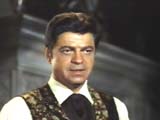 In 1968, a year before the series was cancelled, he suffered a near-fatal heart attack. With the end of the series inevitable, Martin was finally given recognition for his work with an Emmy nomination. Martin continued with roles in television after the series, but it is believed he was passed over for leading parts because of his health. He died on July 3, 1981 at the age of 61, after collapsing in the middle of a tennis game in 100-degree heat.
In 1968, a year before the series was cancelled, he suffered a near-fatal heart attack. With the end of the series inevitable, Martin was finally given recognition for his work with an Emmy nomination. Martin continued with roles in television after the series, but it is believed he was passed over for leading parts because of his health. He died on July 3, 1981 at the age of 61, after collapsing in the middle of a tennis game in 100-degree heat.
Michael Dunn
A three-foot-ten-inch actor, Dunn portrayed Dr. Loveless in ten episodes starting with The Night the Wizard Shook the Earth. He was born Gary Neil Miller on October 20, 1924 in Shattuck, Oklahoma. He was blessed with an IQ of 178 and at fifteen, he became a concert pianist until he was stricken by chondrodystrophy, a congenital disease that permanently crippled his elbows and ended his career as a pianist. He then took up acting, eventually winning critical acclaim for his performance in the Broadway production of The Ballad of the Sad Cafe. In addition to his Oscar-nominated performance in Ship of Fools, he also appeared in Francis Ford Coppola's You're a Big Boy Now, Don Siegel's Madigan, and horror thrillers like The Mutations. Not to mention a classic episode of Star Trek, in which he played the only servant on a planet of gods (who then turns down his chance to be like them, very unlike Dr. Loveless).
Other Villains Who Vexed West
Victor Buono
A favorite villain on the series, Victor Buono appeared as Wing Fat in the pilot episode, The Night of the Inferno and as Count Manzeppi in two episodes, The Night of the Eccentrics and The Night of the Feathered Fury. He was born in 1938 in San Diego and worked in stock theatre and television (The Untouchables and Batman are among his credits) before making his sensational screen debut in Whatever Happened to Baby Jane? (1962), opposite Bette Davis and Joan Crawford. Due to his immense size and weight (over 300 pounds), he was mostly cast as a heavy in a variety of American and international productions like The Strangler, Hush...Hush, Sweet Charlotte, The Mad Butcher and a Matt Helm movie (as a Chinese villain stealing U.S. missle technology).
Enzo
A truly unique character actor who was much in demand in the sixties, T. C. Jones specialized in cross-dressing and deranged behavior. He was born on October 26, 1920 in Pennsylvania and his real name was Thomas Craig Jones. In addition to his outlandish appearance as the villainess/villain Enzo in "The Night of the Running Death," he was also hard to forget as Mr. and Mrs. Ace in "Head", The Monkees' self-deprecating musical satire, and as Mr. and Mrs. Terry in the psychodrama, The Name of the Game is Kill. Other notable appearances include "3 Nuts in Search of a Bolt" with Mamie Van Doren, "Promises! Promises!" with Jayne Mansfield, and "An Unlocked Window," one of the creepiest episodes ever made for TV's "The Alfred Hitchcock Hour."
Ida Lupino
This British-born actress left her mark on the series with her role as the diabolical Dr. Faustina in "Night of the Big Blast" (the one in which she uses the Frankenstein method to build a West clone). Born Feb. 4, 1918 in London to British revue- and film-comedian Stanley Lupino and actress Connie Emerald, Lupino came from a long line of entertainers — theater had been a tradition in her family since the 17th century. She made her screen debut at the age of 15 as a Lolita-type character in the British film "Her First Affair" (1933). Supplied with a Paramount contract, Lupino came to Hollywood that same year, but didn't land any memorable roles until her strong performance in The Light That Failed (1940). She played a succession of roles as tough, ambitious women and was awarded a New York Film Critics award for her performance in The Hard Way (1943). Moving into writing, directing and producing, Lupino launched her own production company in the '50s. During that decade she was virtually the only woman director working in Hollywood. In her later years, Lupino made a number of television appearances and several more films, as well as directing episodes of Thriller and The Twilight Zone. She died on August 3, 1995 at the age of 77, the result of a stroke, in Los Angeles.
Richard Pryor
Famous for his earthy, profane humor and impersonations of street-wise characters, Pryor came from a poverty-ridden childhood in Peoria, Illinois, where he was raised amid cheap bars, brothels, and poolhalls. He dropped out of school at 14 and worked various menial jobs before joining the Army where he was stationed in Germany for two years. Returning home, Pryor pursued a career as a stand-up comic, eventually achieving national fame on The Ed Sullivan Show and The Tonight Show. He made his film debut in William Castle's gangland comedy, "The Busy Body" and scored his first major role opposite Diana Ross in "Lady Sings the Blues" in 1972. That same year he released his first comedy album, "That Nigger is Crazy," and went on to win an Emmy award for Best Writing for a Lily Tomlin special in 1974. He also collaborated on the screenplay of Mel Brooks' "Blazing Saddles" and teamed up with Gene Wilder for a series of comic buddy movies starting with "Silver Streak" (1976). His appearance in "Night of the Eccentrics" (as Victor Buono's reluctant assistant) marks his only appearance in the Wild Wild West series.
Boris Karloff
The master of horror graced the series with his appearance in The Night of the Golden Cobra. The youngest of eight children, he emigrated to Canada in 1909 to work as a farmhand, giving up a career in the diplomatic service. He later pursued work on the stage and joined a touring company, eventually making his way to Los Angeles where he made his film debut as an extra in "The Dumb Girl of Portici" (1916). Although typecast as a stock villain in numerous silent films, Karloff's career gained momentum during Hollywood's transition to sound due to his distinctive stage-trained voice. He scored his first major role in "The Criminal Code", but the real turning point was his appearance as the monster in James Whale's version of "Frankenstein", a role Bela Lugosi had turned down. He went on to carve out a permanent niche for himself in the horror film genre. Other career highlights include The Mummy (1932), The Black Cat (1934), Tower of London (1939), the TV series Thriller which he hosted, and his performance as an aging film star in Peter Bogdanovich's first feature, "Targets" (1968), a thriller inspired by the Charles Whitman shooting spree in Texas which climaxes at a drive-in where Karloff is walking toward the killer as he's walking the same way in an old movie on the screen behind.
Wild Wild West homepage
The Gadgets
The Stunts and Injuries
How The Series Was Created
Official TNT Wild Wild West Biographies Pages (if it's still there)

 In the early '60s, he cut two records and did an American Bandstand appearance with friend Dick Clark. One of Conrad's recordings, "Mi Conformo," done for a Spanish language label, outsold the Beatles at that time in Latin America, he said in an interview. After The Wild Wild West was cancelled, Conrad went on to star in the series The D. A. and continued to work extensively in television, both in front of and behind the camera. He also directed a film called The Bandits. In the last few years, former agent West has appeared in several films, including the upcoming New Jersey Turnpike.
In the early '60s, he cut two records and did an American Bandstand appearance with friend Dick Clark. One of Conrad's recordings, "Mi Conformo," done for a Spanish language label, outsold the Beatles at that time in Latin America, he said in an interview. After The Wild Wild West was cancelled, Conrad went on to star in the series The D. A. and continued to work extensively in television, both in front of and behind the camera. He also directed a film called The Bandits. In the last few years, former agent West has appeared in several films, including the upcoming New Jersey Turnpike.
 As the athletic, swashbuckling half of the West/Gordon team, Robert Conrad performed most of his own stunts for the series. Born Conrad Robert Falk in Chicago on March 1, 1935, he was a former boxer and nightclub singer before he embarked on an acting career. Prior to his work on The Wild Wild West, Conrad starred in the television series Hawaiian Eye and had bit parts in several films, including The Commies are Coming, the Commies Are Coming and Palm Springs Weekend. He had just completed a film called Young Dillinger when he began work as secret agent James T. West at the age of 29. Conrad had lived in Spain and been interested in Flamenco dance and bull fighting as a young man, a fitting background for his character.
As the athletic, swashbuckling half of the West/Gordon team, Robert Conrad performed most of his own stunts for the series. Born Conrad Robert Falk in Chicago on March 1, 1935, he was a former boxer and nightclub singer before he embarked on an acting career. Prior to his work on The Wild Wild West, Conrad starred in the television series Hawaiian Eye and had bit parts in several films, including The Commies are Coming, the Commies Are Coming and Palm Springs Weekend. He had just completed a film called Young Dillinger when he began work as secret agent James T. West at the age of 29. Conrad had lived in Spain and been interested in Flamenco dance and bull fighting as a young man, a fitting background for his character.
 The first and only choice for the role of agent Artemus Gordon, master of disguise, Ross Martin was born Martin Rosenblatt in Grodek, Poland, on March 22, 1920. Still an infant when his parents immigrated to America, Martin grew up in New York City and spoke Yiddish, Polish and Russian before even learning English. He later added French, Spanish and Italian to his amazing repertoire. Though he received honors with his degrees in psychometrics and law, Martin pursued an acting career along with his studies, starting as a standup comic and performing on radio and early television.
The first and only choice for the role of agent Artemus Gordon, master of disguise, Ross Martin was born Martin Rosenblatt in Grodek, Poland, on March 22, 1920. Still an infant when his parents immigrated to America, Martin grew up in New York City and spoke Yiddish, Polish and Russian before even learning English. He later added French, Spanish and Italian to his amazing repertoire. Though he received honors with his degrees in psychometrics and law, Martin pursued an acting career along with his studies, starting as a standup comic and performing on radio and early television.

 In 1968, a year before the series was cancelled, he suffered a near-fatal heart attack. With the end of the series inevitable, Martin was finally given recognition for his work with an Emmy nomination. Martin continued with roles in television after the series, but it is believed he was passed over for leading parts because of his health. He died on July 3, 1981 at the age of 61, after collapsing in the middle of a tennis game in 100-degree heat.
In 1968, a year before the series was cancelled, he suffered a near-fatal heart attack. With the end of the series inevitable, Martin was finally given recognition for his work with an Emmy nomination. Martin continued with roles in television after the series, but it is believed he was passed over for leading parts because of his health. He died on July 3, 1981 at the age of 61, after collapsing in the middle of a tennis game in 100-degree heat.
